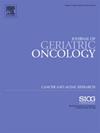针对老年癌症幸存者身体机能的饮食和运动干预措施的范围综述。
IF 3
3区 医学
Q3 GERIATRICS & GERONTOLOGY
引用次数: 0
摘要
在年轻癌症幸存者中开展癌症连续护理过程中的生活方式(饮食和锻炼)干预 (本文章由计算机程序翻译,如有差异,请以英文原文为准。
A scoping review of diet and exercise interventions for older cancer survivors' physical function
Lifestyle (diet and exercise) interventions across the cancer care continuum among younger cancer survivors (<60 years of age) demonstrate utility in improving physical function, and other cancer relevant health outcomes. However, the impact of lifestyle interventions on physical function in older (≥60 years) cancer survivors is not entirely clear. This scoping review aims to map and characterize the existing literature on the effect of diet and exercise interventions on physical function in older cancer survivors. Conducted to the JBI Manual for Evidence Synthesis and reported to the PRISMA guidelines, the literature search was performed on multiple databases through March 2024. A total of 19,901 articles were identified for screening with 49 articles published between 2006 and 2024 selected for full-text review. Of these, 36 studies included an exercise intervention, two focused on diet intervention, while 11 studies included both diet and exercise intervention. These 49 studies included various cancer types, cancer stages, and timepoints across the cancer care continuum. Most studies described physical function as their primary outcome and demonstrated maintenance or improvement in physical function. We identified several gaps in the current evidence including lack of (adequately powered) trials focused only on older cancer survivors, and trials focused on dietary interventions alone or dietary interventions combined with exercise interventions within this population vulnerable for nutritional inadequacies and declining physical function. Considering the growing population of older cancer survivors, this represents an important area for further research.
求助全文
通过发布文献求助,成功后即可免费获取论文全文。
去求助
来源期刊

Journal of geriatric oncology
ONCOLOGY-GERIATRICS & GERONTOLOGY
CiteScore
5.30
自引率
10.00%
发文量
379
审稿时长
80 days
期刊介绍:
The Journal of Geriatric Oncology is an international, multidisciplinary journal which is focused on advancing research in the treatment and survivorship issues of older adults with cancer, as well as literature relevant to education and policy development in geriatric oncology.
The journal welcomes the submission of manuscripts in the following categories:
• Original research articles
• Review articles
• Clinical trials
• Education and training articles
• Short communications
• Perspectives
• Meeting reports
• Letters to the Editor.
 求助内容:
求助内容: 应助结果提醒方式:
应助结果提醒方式:


